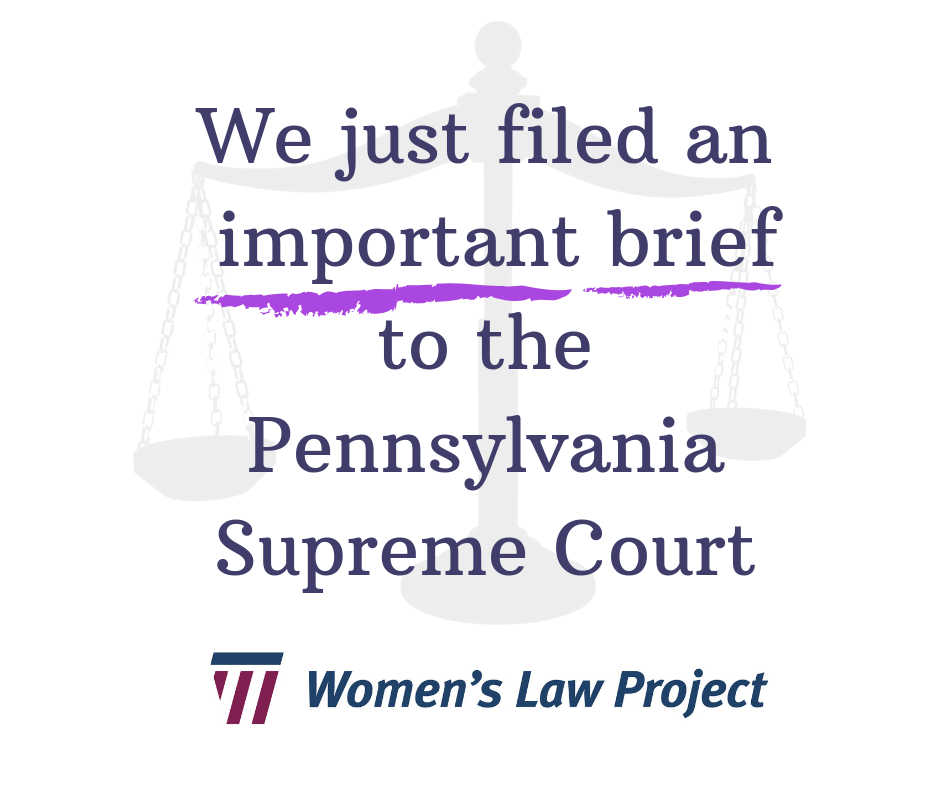
The Women’s Law Project filed an amicus (“friend of the court”) brief supporting a decision that prohibited an adult defendant accused of rape from directly cross-examining his underage victim while at trial.
The case in question is Commonwealth of Pennsylvania v. Patrick Tighe.
Appellant Tighe was convicted of rape, involuntarily deviate sexual intercourse, and sexual assault after a three-day trial back in 2013. Tighe was 58 years old when he assaulted the 15-year-old female victim.
“The right to represent yourself at trial does not reasonably extend to the right to personally interrogate a child victim of rape,” says WLP attorney Amal Bass, who filed the brief and co-drafted it with Teri Garvey, Attorney Advisor at AEquitas.
“Victims of traumatic crimes of violence or intimidation should not be subjected to the humiliating ordeal of being personally cross-examined at trial by the same individual responsible for violating their safety, security, or bodily integrity,” says AEquitas Attorney Advisor Garvey.
The Case
At trial, Tighe requested to personally interrogate his teenage rape victim. During this phase, Tighe insisted that he should have the right to not only personally cross-examine the victim, but also to interrogate her about her sexual history–despite a rape shield statute that explicitly prohibits such questions.
The court refused Tighe’s request. Instead, the defendant was allowed to write questions to be asked of the victim, while standby counsel did the actual questioning.
This decision was based on many factors including the victim’s age (16 at the time of the trial) and circumstances of the case, including the fact the defendant violated a no-contact bail condition by calling the victim to ask “Why are you doing this to me?” and beg that she not “put [him] in jail for life.”
The victim testified that the actions of the defendant, a family friend she once knew as “Uncle Pat,” scared her and made her feel she was “in danger.”
Tighe was convicted of rape, involuntarily deviate sexual intercourse, and sexual assault and sentenced to up to 40 years. He appealed his conviction to the Pennsylvania Superior Court, arguing he should have been allowed to interrogate his victim trial. The Superior Court upheld the decision.
Tighe then appealed to the Pennsylvania Supreme Court, which agreed to hear the case.
Our Argument
In the brief, we argue that in situations like this, it is appropriate for courts to place reasonable limitations on a defendant’s right to self-representation.
Requiring standby counsel to conduct cross-examination—as was done in Tighe’ case–otherwise directed by the pro se defendant balances the defendant’s right to advance the evidence, arguments, and positions of their choice with the important goals of reducing emotional harm to victims and upholding the integrity of the justice system.
Social science research shows that interacting with the criminal justice system can exacerbate emotional trauma for victims of violence, especially children. The importance of protecting victims of domestic violence, sexual violence, and stalking from personal contact with their abusers has also been consistently recognized by this Commonwealth.
Pennsylvania has an established history of recognizing the need to protect victims from re-victimization while interacting with the criminal justice system, including the “confrontation clause” amendment to the state Constitution, which allows child victims to testify outside the presence of defendants in criminal proceedings.
The General Assembly has also taken action on this issue, and has repeatedly passed legislation (itemized in the brief) that specifically permits accommodations for victims to avoid re-traumatization.
Read or download the entire brief here.
In addition to WLP and AEquitas, this brief is supported by 21 non-profit organizations, including Atlanta Women for Equality, California Women’s Law Center, Chicago Alliance Against Sexual Exploitation, Connecticut Women’s Education and Legal Fund, End Rape on Campus, Equal Rights Advocates, Freedom Network USA, Futures Without Violence , Gender Justice, Harvard Law School Gender Violence Legal Policy Workshop, Legal Momentum, the Women’s Legal Defense and Education Fund, Legal Voice, National Crime Victim Law Institute, National Crittenton, National Organization for Women Foundation, National Women’s Law Center, Pennsylvania Coalition Against Domestic Violence, Southwest Women’s Law Center, SurvJustice, Victim Rights Law Center and Women’s Law Center of Maryland.
The Women’s Law Project is a public interest law center in Pennsylvania devoted to advancing the rights of women and girls.
Sign up for WLP’s Action Alerts here. Follow us on twitter and like us on Facebook.
We are a non-profit organization. Please consider supporting equal rights for women and girls by making a one-time donation or scheduling a monthly contribution.


